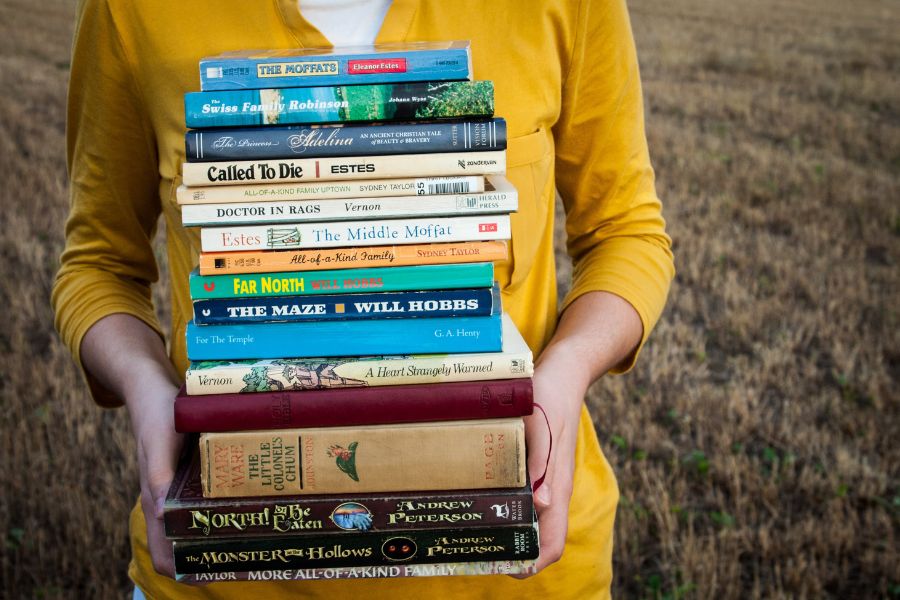Fiction vs nonfiction: two categories, two different worlds of reading and writing. But which one is for you?
Whether you’re a voracious reader or an aspiring writer, understanding these differences can transform your reading choices and writing style.
This article delves into the core characteristics of both fiction and nonfiction, uncovering the essence of imagination in fiction and the grounding in reality of nonfiction. We’ll explore popular genres, key elements, and the distinct advantages of both realms.
As we journey through the nuances of each genre, get ready to uncover insights that will enrich your literary experience.
Let’s begin.

Core Characteristics of Fiction
Fiction is where imagination reigns supreme, crafting stories from the fantastical to the mundane.
It’s a realm where anything is possible, from the magical corridors of Hogwarts to the dystopian future of Orwell’s 1984.
But fiction is more than just make-believe; it mirrors our world, exploring human emotions and societal issues under the guise of fictional narratives.
Fiction captures our imagination with its diverse storytelling methods. It’s a realm where creativity knows no bounds, offering a variety of genres, key elements, and enriching benefits.
Common Fiction Genres

Fiction comes in many flavors, each genre presenting a unique world of storytelling:
- Literary Fiction: This genre is celebrated for its depth, character development, and introspective narratives. It often tackles complex themes and societal issues, for example, fiction books like Harper Lee’s To Kill a Mockingbird, which delves into racial injustice and moral growth.
- Mystery/Thriller: These stories are all about suspense, intrigue, and plot twists. They keep readers hooked with puzzles to solve and dangers to evade. A prime fiction book example is Agatha Christie’s And Then There Were None, a classic that keeps readers guessing until the very end.
- Science Fiction/Fantasy: These genres often explore alternate realities, advanced technology, and mythical beings. J.R.R. Tolkien’s The Lord of the Rings is a hallmark of fantasy, creating an entire universe with its own history, languages, and races.
- Romance: Central to these stories are love and relationships. They delve into the emotional dynamics between characters, often leading to a satisfying resolution. Nicholas Sparks’ A Walk to Remember is a beloved novel that explores the enduring power of love.
- Historical Fiction: This genre offers a blend of accurate historical details with creative storytelling. Ken Follett’s The Pillars of the Earth is an epic tale of the Middle Ages, combining real historical elements with fictional characters and plots.
Elements of Great Fiction
Several elements come together to make a work of fiction memorable and impactful:
- Compelling Characters: The heart of any fiction story lies in its characters. Whether it’s the playful and intelligent Elizabeth Bennet in Jane Austen’s Pride and Prejudice or the resilient Katniss Everdeen in Suzanne Collins’ The Hunger Games, compelling characters stay with readers long after the fiction book is closed.
- Engaging Plot: A great plot keeps the pages turning. It’s filled with conflicts, climaxes, and resolutions. An engaging plot often includes unexpected twists, like the intricate storylines in Arthur Conan Doyle’s Sherlock Holmes series, where each twist keeps the reader deeply engaged.
- Rich Themes: Themes are the underlying messages of the story. They can be moral, philosophical, or social, like the exploration of survival in William Golding’s Lord of the Flies, or the themes of love and sacrifice in Khaled Hosseini’s The Kite Runner.
- Distinctive Voice and Style: How a story is told can significantly impact how readers experience it. The unique voice of Mark Twain in The Adventures of Huckleberry Finn or imaginative style of Lewis Carroll in Alice in Wonderland set these works apart and give them unique flavor.
These elements, when woven together skillfully, create fiction that not only entertains but also resonates and remains with readers.
Benefits of Fiction
Fiction is often seen as a source of entertainment. But its benefits go beyond amusement. The advantages of engaging with fiction are multi-dimensional, enriching readers in various ways:
- Fosters Empathy: By placing readers in the shoes of diverse characters, fiction builds a bridge of understanding. Experiencing a story through the eyes of characters from different backgrounds, like in Harper Lee’s To Kill a Mockingbird, allows readers to develop a deeper understanding of others’ experiences.
- Explores Complex Emotions and Situations: Fiction provides a safe space to navigate challenging emotions and scenarios. It can offer comfort during difficult times or provide insight into complex psychological states, as seen in Sylvia Plath’s The Bell Jar.
- Cultural and Historical Insight: Fiction often reflects the cultural and historical contexts of its setting. Engaging with novels like Leo Tolstoy’s Anna Karenina can offer a clearer understanding of the historical and social dynamics of 19th-century Russia.
- Respite from Reality: In a fast-paced world, fiction offers an escape, a momentary break from daily stress and routine. It allows readers to lose themselves in other worlds, providing a sense of relaxation and rejuvenation.
In other words, fiction is not just a pastime but a tool for personal growth and understanding. It enables readers to experience life from multiple perspectives, and enriches their personal development.
Understanding Nonfiction

Nonfiction text plants its feet firmly in the world of facts and reality.
It ranges widely, covering biographies like Ron Chernow’s Alexander Hamilton to explorations of specific topics in the real world, like John James Audubons’ The Birds of America.
Now let’s take a look at the unique characteristics and benefits of nonfiction:
Common Nonfiction Genres
Nonfiction covers a broad spectrum of genres, including:
- Biographies or Memoirs: These are accounts of real people’s lives, offering intimate glimpses into their experiences. For example, works like The Diary of Anne Frank provide a personal perspective on historical events.
- Self-Help and Educational: Focused on personal improvement, these nonfiction books offer advice and wisdom, like The 7 Habits of Highly Effective People by Stephen R. Covey, which provides strategies for personal and professional efficiency.
- Science and History: These delve into factual and educational content. A Brief History of Time by Stephen Hawking, for instance, explains complex scientific concepts in an accessible way.
- Travel and Culture: A nonfiction book in this genre explores various cultures and places. Notes from a Small Island by Bill Bryson humorously and insightfully details travels across Britain.
Elements of Great Nonfiction
When it comes to nonfiction text, certain elements are crucial in crafting a work that is not only informative but also engaging and impactful. For example:
- Accuracy and Research: Nonfiction is committed to truth and factual accuracy. This involves meticulous research and verification of information, as seen in The Immortal Life of Henrietta Lacks by Rebecca Skloot, where years of research bring to life a compelling story about science and history.
- Clarity and Structure: Effective nonfiction breaks down complex ideas and presents them in a clear way. This ensures that the content is accessible to a wide range of readers. For example, Charles Duhigg’s The Power of Habit by Charles Duhigg distills intricate psychological concepts into helpful narratives and frameworks.
- Engaging Narrative: Nonfiction doesn’t have to be dry; it can captivate readers with a narrative that’s as engaging as any novel. This is evident in books like Born a Crime by Trevor Noah, where the narrative is both informative and personal.
- Relevance and Timeliness: The best nonfiction often either speaks to current issues or timeless human experiences. John Carreyrou’s Bad Blood, about the fall of Theranos, exemplifies how nonfiction can provide insights into modern business.
- Inspirational and Motivational Elements: Nonfiction can uplift and motivate, offering stories of triumph or practical guidance. A nonfiction book, like Educated by Tara Westover, inspires readers with personal tales of overcoming adversity and pursuing knowledge.
These elements, when effectively combined, transform a nonfiction work from a mere source of information into a powerful tool for education, inspiration, and change.
Benefits of Nonfiction
While fiction takes us on journeys of the imagination, nonfiction brings us back to the tangible world, enriching our understanding in distinct and valuable ways.
- Educational Value: From the intricacies of historical events in books like Unbroken by Laura Hillenbrand, to the latest scientific theories in works like The Hidden Life of Trees by Peter Wohlleben, nonfiction educates and enlightens on numerous subjects.
- Inspiration and Motivation: Real-life success stories abound in nonfiction. Books like Outliers by Malcolm Gladwell explore the factors behind extraordinary success, offering readers both inspiration and practical lessons for their own lives.
- Practical Skills and Strategies: Many nonfiction books provide actionable advice. Whether it’s improving personal productivity with James Clear’s Atomic Habits by or learning about finances from Robert Kiyosaki’s Rich Dad Poor Dad, nonfiction offers practical skills that can be applied in daily life.
- Reflection and Self-Discovery: Nonfiction can also be a tool for self-reflection. The Autobiography of Benjamin Franklin is a quintessential example, encouraging readers to think about their own paths and pursuit of self-improvement.
Nonfiction anchors readers in the real world, providing valuable insights, practical knowledge, and a deeper understanding of the diverse aspects of life and society.
Key Differences Between Fiction and Nonfiction

Understanding the distinctions between fiction and nonfiction can greatly enhance your reading experience and writing skills.
Here are four key differences to consider:
- Reality vs. Imagination: Fiction offers narratives that may not be factually true but resonate emotionally. Nonfiction is anchored in factual accuracy, presenting real events, people, and ideas.
- Authorship and Purpose: In fiction, authors use their creativity primarily to explore human experiences, emotions, and imaginary worlds. Nonfiction writers, however, aim to inform, educate, or argue facts and ideas. Their purpose is more directly tied to conveying information or real-life experiences.
- Structure and Style: Fiction can take any structural form the author chooses, allowing flexibility in narrative style, plot development, and character arcs. Nonfiction, especially academic or technical writing, tends to be more structured, prioritizing clarity and logical flow of information.
- Impact on the Reader: Fiction primarily engages the reader’s emotions, imagination, and empathy. It invites readers into an experiential journey through story. Nonfiction can also be emotionally engaging, but primarily stimulates intellectual curiosity.
So whether you’re reading for pleasure, education, or inspiration, recognizing these distinctions can help you choose the right type of book for your current needs and enhance your overall reading experience.
Choosing Between Fiction and Nonfiction as a Reader & Writer

Deciding whether to dive into a work of fiction or nonfiction can be guided by your current needs, interests, and goals, both as a reader and a writer.
Here’s how to make an informed choice:
As a Reader:
- Identify Your Goals: Are you seeking an escape into imaginative worlds, or do you want to learn about a specific topic? Fiction is ideal for entertainment and emotional exploration, while nonfiction is great for learning and understanding real-world issues.
- Consider Your Mood and Interests: If you’re in the mood for creativity and storytelling, choose fiction. If you’re curious about history or science or wish to develop personal skills, nonfiction is your go-to.
- Mix It Up for a Balanced Diet: Regularly switching between fiction and nonfiction can enrich your reading experience, offering both the joy of stories and the satisfaction of learning.
As a Writer:
- Align with Your Passion and Expertise: If you have a flair for storytelling and creating characters, writing fiction might be more fulfilling. But if you have expertise in a particular field or a strong desire to share real-world knowledge, try nonfiction writing.
- Understand the Market and Audience: Research the current market trends. Fiction genres like fantasy or romance might have a broad audience, but niche nonfiction topics can also attract dedicated readerships.
- Experiment with Both: Try writing short pieces in both genres. This experimentation can help you discover where your writing strengths and preferences lie.
Your choice between fiction and nonfiction should align with what you seek to gain or express through your reading and writing. Balancing both can lead to a richer, more diverse literary experience.
Fiction vs Nonfiction: Embracing the Power of Both Worlds

The question of “fiction vs nonfiction” doesn’t have to be a war. Both types of writing have unique characteristics, benefits to offer, and the ability to enrich our lives as readers and writers.
Armed with your new knowledge about the elements and advantages of both, you can confidently navigate the vast sea of literature, selecting the perfect book for any moment.
You’re now equipped not just to choose between fiction and nonfiction, but to embrace the best of both, enhancing your understanding of the world and yourself.



